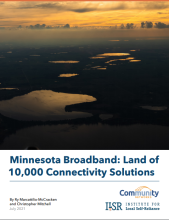Jim Baller Testimony Outlines the Consequences of State Preemption Laws
In September, we wrote about the elimination of significant state barriers in Arkansas and Washington as legislators at the state level pushed to overturn the laws protecting monopoly providers which prevent localities from building and operating their own broadband infrastructure.
The result of those moves is that the number of states which maintain barriers to community-owned networks fell to 17, heralding significant progress for the future.
The same week, Coalition for Local Internet Choice (CLIC) President Jim Baller testified before the Missouri House of Representatives' Interim Broadband Development Committee to address the state of preemption across the U.S. There, he argued that the "Missouri Legislature should follow the lead of Arkansas and Washington State and repeal the restrictions in R.S.Mo. § 392.410, once and for all. It should also reject any proposed new restrictions on municipal, cooperative, or public-private broadband projects."
During the course of his remarks he makes a powerful case against "state barriers to municipal, cooperative, or public-private broadband initiatives":
[The] are not only bad for the communities involved, but they also hurt the private sector in multiple ways. They prevent private companies from making timely sales of equipment and services to municipal or cooperative networks. They impede companies from using advanced public or cooperative networks to offer businesses and residential customers an endless array of modern products and services. They thwart economic and educational opportunities that can contribute to a skilled workforce that would benefit existing and new businesses across the state. They also deny the community the economic and social benefits from which everyone in the community can benefit, including the private sector.
He continues:




